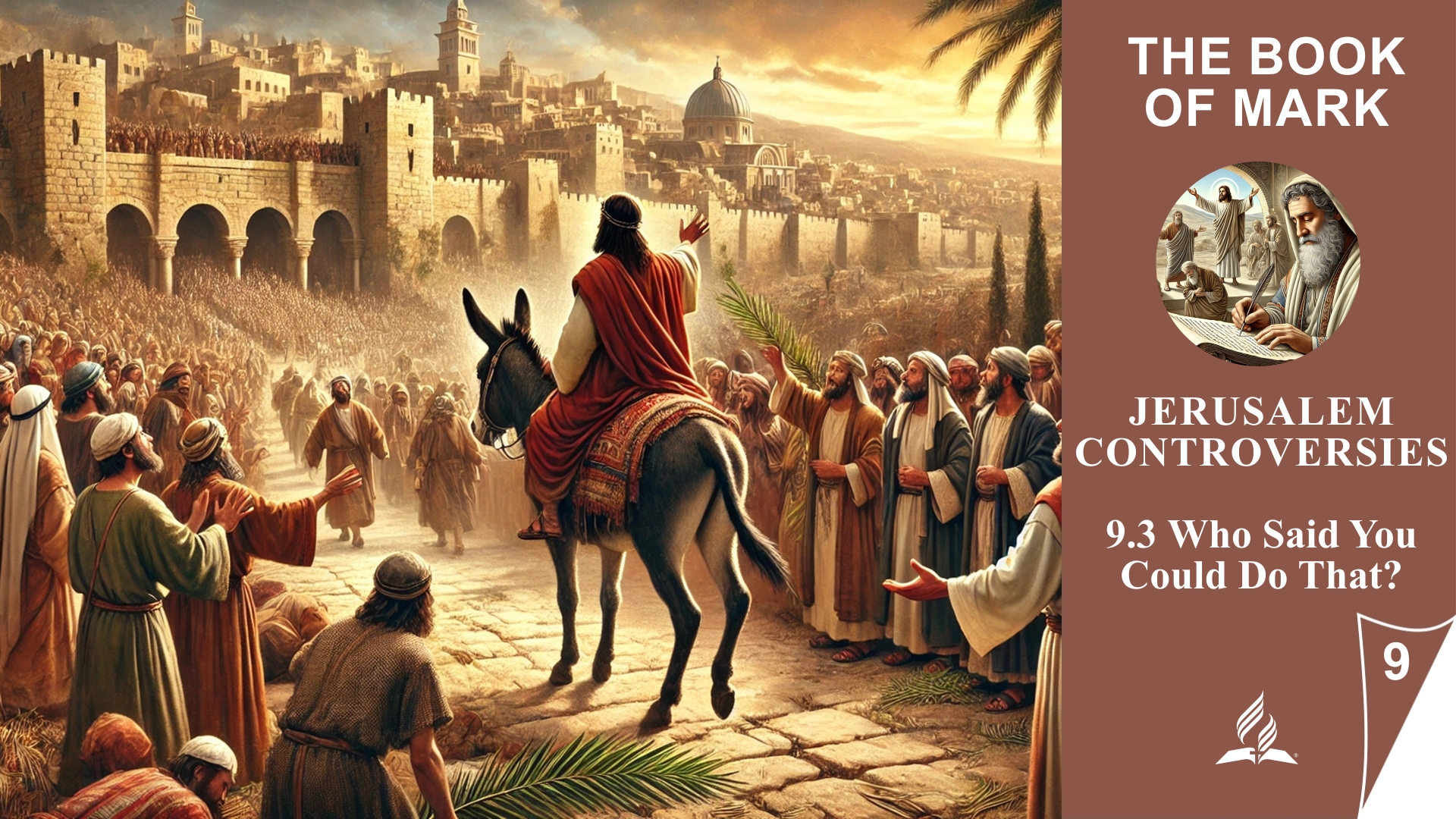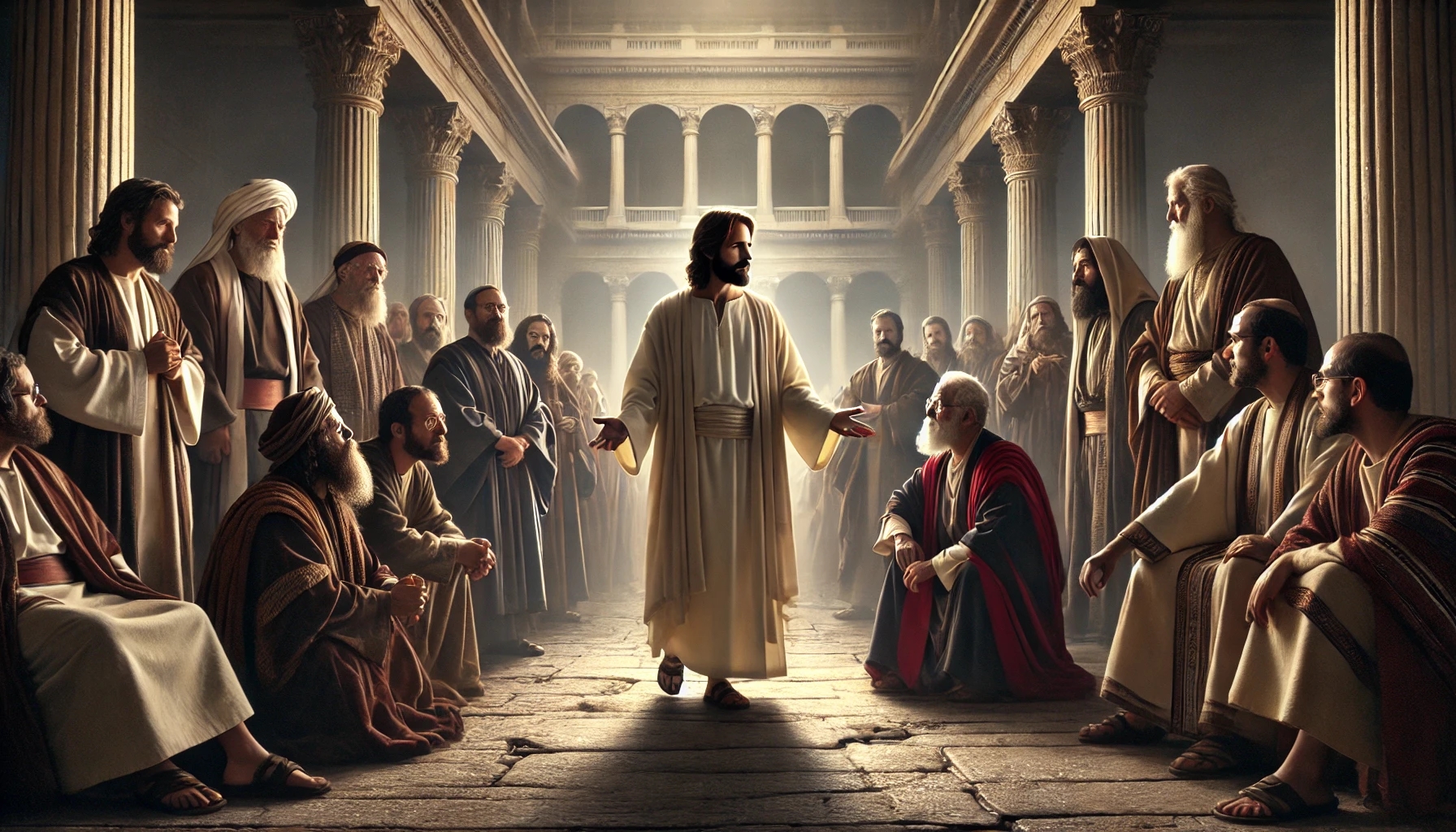


9.3 Who Said You Could Do That?
The Challenge to Authority: Jesus’ Wise Response to the Religious Leaders
Read Mark 11:27–33. What challenge did the religious leaders bring to Jesus, and how did He respond?
The encounter between Jesus and the religious leaders in the temple court is a striking example of how Jesus responds to challenges with wisdom and authority. The leaders come not to seek truth but to trap Jesus and question His authority. Their intention is to either engage Him in a theological debate or to discredit Him before the people.
However, Jesus exposes their deceit by confronting them with a question of His own—the question about the origin of John’s baptism. By doing so, He puts the leaders in a dilemma that reveals their greater concern for maintaining their own positions rather than recognizing the truth. Their inability to provide a clear answer demonstrates their insincerity and their inability to recognize spiritual authority when it stands before them.
This exchange teaches us the importance of having our questions and doubts come from a sincere heart seeking truth, rather than from a stance of defending our own position. It reminds us that true authority and wisdom come from God and that in moments of challenge, we should rely on God’s guidance and truth rather than human cunning.
Read Mark 12:1–12. What did Jesus do after He refused to answer, and what was the result?
After Jesus skillfully avoided answering the religious leaders’ question, He tells them the parable of the vineyard. This parable is not merely a story but a powerful prophetic warning. Jesus uses the familiar image of the vineyard to make the seriousness of the situation clear to the religious leaders.
In the parable, the tenants represent the religious leaders who abuse God’s trust and mistreat and reject the prophets (the servants of the owner). The beloved son represents Jesus Himself, whom God sends as a final attempt to reach the hearts of the people. Instead of respecting Him, the tenants plan to kill Him, mistakenly believing that this will give them control.
Through this parable, Jesus holds up a mirror to the leaders: their rejection of Jesus is not just a human failure but a spiritual transgression of the highest order. The parable ends with a clear judgment: the owner will remove the evil tenants and give the vineyard to others.
The religious leaders immediately recognize that the parable is directed against them, but instead of repenting, they harden their hearts further and seek ways to eliminate Jesus. This reaction illustrates the tragedy of their situation: they are presented with an opportunity for repentance but choose the path of rebellion.
The parable thus serves as a warning not only to the religious leaders of the time but also to us today. It reminds us that we are to be faithful stewards of what God has entrusted to us and that rejecting God’s message has serious consequences. Yet, it also offers hope: as long as we are willing to open our hearts and change, there is always a way back to God.
The encounter between Jesus and the religious leaders in Mark 11:27–33 and the subsequent parable of the vineyard in Mark 12:1–12 have deep relevance for our daily lives and faith.
-
Questioning Our Own Motives: In daily life, we often question others’ decisions or motives, sometimes with hidden agendas. Just as the religious leaders questioned Jesus not from a sincere heart but with deceit, we should examine whether our questions and doubts genuinely seek the truth or merely defend our own position. Honest faith requires us to seek God with an open heart, ready to be corrected and guided by Him.
-
Recognition of True Authority: The religious leaders could not recognize Jesus’ authority because they were trapped in their own traditions and power structures. Likewise, we can sometimes be blind to God’s work in our lives because it doesn’t match our expectations or ideas. We are invited to acknowledge divine authority in our lives and trust in God’s guidance, even if it means letting go of our own plans.
-
Responsibility as Stewards: The parable of the vineyard reminds us that we are stewards of everything God has entrusted to us—whether our faith, talents, relationships, or resources. Like the tenants in the parable, we are called to use these gifts fruitfully and faithfully. This means taking responsibility in our daily lives and using what has been given to us in accordance with God’s will.
-
The Danger of Hardening: The religious leaders’ response to the parable, where they hardened their stance against Jesus, led them down a path of further rejection. We face daily choices in how we respond to God’s word and guidance—whether we harden our hearts or open them to be led by Him. This choice impacts our spiritual growth and relationship with God.
-
Hope for Repentance: The parable also shows that it is never too late to repent. God always offers the opportunity for repentance and return. In our daily lives, this means being ready to admit our mistakes, repent, and continually align ourselves with God’s path.
In summary, these passages challenge us to keep our hearts open, recognize God’s authority in our lives, take responsibility for what we’ve been entrusted with, and be always ready to repent. In doing so, we can grow in our faith and develop a deeper relationship with God.

True wisdom is shown by trusting in God’s guidance, even when questioned by others.
(Visited 13 times, 1 visits today)





















